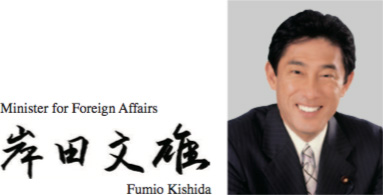Foreword
In February 2015, the Cabinet decided on the Development Cooperation Charter that sets forth the policy of Japan's development cooperation for the years ahead. The Charter marks the first revision in 12 years of the Official Development Assistance (ODA) Charter, which was established in 2003.
The new Charter takes into consideration the significant changes that have recently occurred in the international environment surrounding development cooperation. In today's world, further advances in globalization have brought widespread benefits on the one hand, while on the other hand, poverty and conflict still persist, and countries around the world are faced with a growing list of risks, including infectious diseases. We have also witnessed further increases in private flows to developing countries and the ever-expanding presence of emerging donor countries. With the political and security environment transforming all over the world, development cooperation has assumed a larger role in achieving regional peace and stability, including in peacebuilding, as well as in sharing universal values. Japan's development cooperation from here on will need to adapt appropriately to these changes in the international environment.
The new Charter makes clear that Japan's development cooperation in the next generation will maintain the direction taken and the achievements made by Japan's ODA, which commemorated its milestone 60th anniversary in 2014. Japan's ODA has secured peace and prosperity in Japan while contributing to economic development and poverty reduction in developing countries around the globe, especially in Asia. The basic approach pursued by Japan's ODA, namely, working shoulder-to-shoulder with partner countries, supporting the self-help efforts of developing countries, promoting their sustainable economic growth, and achieving the human security of each and every person, including the socially vulnerable, has significantly contributed to directing the course of international development cooperation.
This year's White Paper takes a look back at the path Japan's ODA has followed over the past 60 years and examines the prospects for Japan's development cooperation. In this milestone year, it is instructive to reflect on how Japan's ODA has played a role to ensure the peace and security of Japan as it developed hand in hand with Asian and other countries ever since the immediate aftermath of World War II, when Japan itself was an aid recipient. It is also worthwhile to think back on how Japan has demonstrated leadership in the international community as a leading donor. Based on the sixty-year course of Japan's ODA, and guided by the new Charter, Japan's development cooperation in the coming years need to pursue cooperative, mutually beneficial relations with developing countries and further strengthen partnerships with stakeholders, including private companies, NGOs, and local governments. Moreover, Japan needs to continue to respond strategically in a constantly changing international environment based on the concept of "Proactive Contribution to Peace," which is rooted in the fundamental principles of international cooperation. I sincerely hope that this White Paper will help deepen understanding of the various topics related to Japan's development cooperation and encourage active discussions.
March 2015

